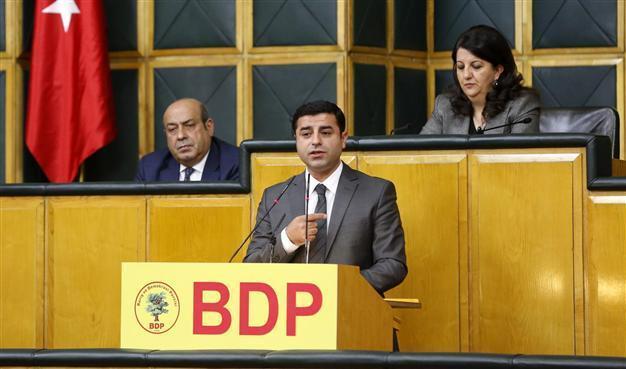Turkey's ruling AKP building its own state: BDP
ANKARA

‘Isn’t building a parallel state a crime? Will not even one person be tried?’ Demirtaş asks during his speech. AA Photo
Peace and Democracy Party (BDP) co-leader Selahattin Demirtaş called on the government to not fire public servants involved in the so-called “parallel state,” and warned they should file legal complaints about these people because building a “parallel state” should obviously be assumed a crime.“Isn’t building a parallel state a crime? Will not even one person be tried? Will you only remove them from their offices?” Demirtaş asked Feb. 4, in a speech delivered at his party’s parliamentary group meeting. “If you have documents, then you shall put it before the courts. No such purge of a ‘parallel state’ is taking place. He just wants to block the parts that disturb him,” he added, in an apparent call on Prime Minister Recep Tayyip Erdoğan.
The term “parallel state” is commonly used by critics of the followers of the U.S.-based Islamic scholar Fethullah Gülen, many of whom have been employed in the judicial and security departments.
“Instead of that, he is building his own state, the AKP’s [ruling Justice and Development Party] state.
And he supposes that he will get away with this. Look at Saddam, look at al-Assad. They built stronger police states than you did. Do you think that clout of al-Assad and Saddam over the court was less than yours? Death penalty decisions were made with only one order. Look where they have gone. There is only one road not taken in Turkey: Democracy. If you take that road, you will succeed,” Demirtaş said.
“The war between Cemaat and the AKP is not a war of democracy,” he also argued.
Since Dec. 17, 2013, Turkey has been shaken by an extensive graft probe, which has pushed Erdoğan to fire a number of Cabinet members. The prime minister’s supporters have cast the investigation as a smear campaign devised by the Gülen Movement, also known as “Cemaat” (Community) or “Hizmet” (Service). Gülen exercises broad, if covert, influence in the media and judiciary.
“If Cemaat really does want to take a stance in line with the fundamentals of our religion, then it should take a stance in favor of justice and rights, but not in favor of political interests,” Demirtaş said.
















